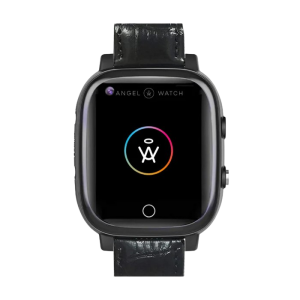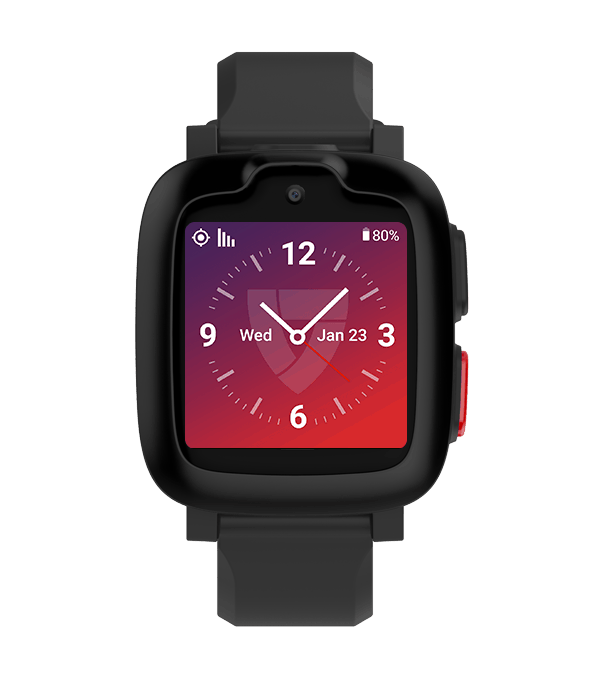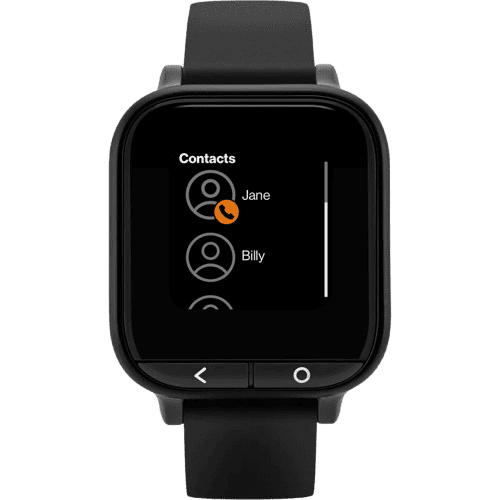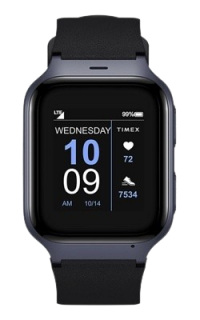
Angel Watch Series R - Assist Review

The Angel Watch Series R – Assist (let's just call it the Angel Watch) is unlike traditional medical alert devices that have a frumpy, clinical appearance. The Angel Watch is a smartwatch that promises to deliver powerful safety features in a device that looks like a stylish timepiece. Can it be as effective as the best medical alert watches, or even the top medical alert systems?
We put the Angel Watch through rigorous tests to see if it delivered on its promises. What we discovered was a device that successfully balances the independence seniors crave with the safety features families need for peace of mind. From one-touch SOS calls to comprehensive health monitoring, this watch packs a surprising punch for its $179.99 price tag.
Key Findings
- The Angel Watch battery lasted two days in our tests, nearly double that of many competitors in the medical alert watch category.
- Unlike a medical alert device, which connects users to a professional monitoring center, the Angel Watch connects users to preselected contacts.
- At $179.99 for the watch and monthly plans starting at $12.99, you're getting impressive value compared to other medical alert devices that often charge twice as much for monthly monitoring.
>> Read More: The Best Medical Alert Systems with GPS
Why Trust Us?
Our team doesn’t just read manufacturer specs. We conduct extensive real-world testing and base our recommendations on more than 5,000 hours of research and hands-on evaluation. Here's what makes our reviews different:
- In our tests of 50 medical alert devices from 15 different brands, we actually wear them, press their buttons, and evaluate their real performance.
- We surveyed 1,250 seniors and caregivers to understand what matters most to actual users.
- Our testing team includes nurses, EMTs, and professional caregivers with firsthand knowledge of what's important in emergency situations.
- We've created dozens of videos documenting our testing process so you can watch these devices in action.
- We continuously monitor industry developments and regularly update our recommendations as technology advances.
How We Tested the Angel Watch
In our tests of the Angel Watch in real-world scenarios, we carefully consider the features and benefits that matter to seniors and their caregivers, including:
- Battery life: We used the watch for calls, tracking, and health monitoring to see how long the battery lasted with realistic use.
- Senior-friendly usability: We put the Angel Watch in the hands of testers with a range of comfort levels with technology. Their feedback helped us understand who this watch works best for.
- Call clarity across environments: We tested calls both indoors and outdoors, in quiet rooms and noisy restaurants, to evaluate real-world performance.
- Water-resistance: Since bathrooms are fall hot spots for seniors, we specifically tested the watch in shower conditions to verify its IP67 rating.
- Health-monitoring accuracy: We compared the watch's vital sign readings against medical-grade devices to assess reliability.
Did You Know: According to CDC data, more than 38,700 older adults died due to unintentional falls, and the fall-related death rate was higher among men than women.
Angel Watch Pros and Cons
Pros
- One-press emergency access: The dedicated SOS button isn't buried in the watch’s menu: It's right there when you need it. During our test calls, we found it incredibly easy to use this feature.
- Health insights: Unlike other smartwatches for seniors, the Angel Watch monitors blood pressure, body temperature, and heart rate, sharing these vitals with loved ones through the Angel Watch app.
- Reliable fall detection: In our controlled fall tests, the Angel Watch detected 70 percent of simulated falls, which is impressive compared to medical alerts with fall detection.
- Peace of mind with geofencing: The Angel Watch allowed us to set alerts when the watch exited or entered certain areas. This feature would be useful for caregivers.
- Video calling: The Angel Watch is the first senior smartwatch we’ve tested that allows for video calling.
Cons
- No professional monitoring backup: If your loved one falls and no family member answers, there's no monitoring center to dispatch help. This is the biggest difference between the Angel Watch and traditional medical alert systems.
- Small touchscreen: Some users might struggle to use this device’s 1.44-inch touch screen.
- Somewhat complicated: While we appreciate the inclusion of extra features like reminders and messaging, this watch might be too complicated for some users.
>> Looking for smaller wearables? Read our list of the Best Medical Alert Bracelets.
Angel Watch Specs
| Watch cost (one-time charge) | $179.99 |
|---|---|
| Monthly plan costs | $5-$20 (varies by carrier) |
| Battery capacity | 800mAh (48-hour tested battery life) |
| Water resistance | IP67 |
| Connectivity | 4G, Wi-Fi |
| Fall detection | Included |
| Operating system | Android 8.1 |
| Display size and type | 1.44″ touchscreen |
What Is the Angel Watch?
The Angel Watch is a GPS-enabled smartwatch designed with a focus on safety and well-being for older users who value their independence. Unlike standard smartwatches, its primary function is to provide emergency assistance and health monitoring rather than detailed fitness tracking or notifications. A key advantage noted by our testers is its discreet design resembling a conventional watch, which we think increases the likelihood of a person actually wearing the device.
By connecting to the Angel Watch app, family members can monitor the watch wearer's location, vital signs, and activity levels. We find this feature particularly valuable, as it enables discreet well-being checks that provide a sense of security while preserving the user's autonomy.
>> Further Reading: Timex FamilyConnect Smartwatch Review
Using the Angel Watch
Unboxing and Setup
Upon receiving the Angel Watch Series R – Assist, we found the packaging professional and well-organized. The package contained the following:
- 1 Angel Watch device
- 1 magnetic charging dock
- 1 USB charging cable
- 1 Preinstalled AT&T SIM card
- 1 Instruction guide
The setup process took about 15 minutes to complete and involved charging the device, downloading the Angel Watch app, and establishing the connection between devices. The inclusion of a preinstalled SIM card made it especially easy to get the watch up and running.
During our evaluation, we observed that while the initial configuration requires moderate technical proficiency, typical of a family member setting up the device for an older adult, the daily operation of the watch itself is considerably more straightforward.
Design and Usability
The Angel Watch presents a balanced approach to form and function. The square face with a 1.44-inch touchscreen display is proportionally larger than a standard watch but maintains a significantly smaller footprint than most medical alert devices on the market.
Our testers wore the watch daily for two weeks to assess the comfort level of extended use. The adjustable band adequately accommodated different wrist sizes, although we noted that individuals with severe arthritis might require assistance with securing the device.
The watch’s screen visibility proved adequate for indoor environments, but it was more difficult to read the screen in direct sunlight, a limitation common to many touchscreen devices in this category, such as the Apple Watch. The touchscreen responsiveness met standard expectations, although users with limited dexterity or larger fingers might struggle with such a small screen.
The dedicated SOS button is thoughtfully positioned for accessibility during emergencies while minimizing the possibility of accidental activation. When we made emergency calls to our preselected contacts, we were pleased with how easy it was to do so and the tactile vibration of the watch that let us know the call had been placed.
Overall, we think the design of the Angel Watch is solid. It looks more or less like a standard smartwatch, without the clunky appearance of medical alert devices like the Kanega Watch.
>> Related: Does Medicare Cover Medical Alert Systems?
FYI: According to the Pew Research Center, 20% of adults ages 60 and older live alone. This rate was higher than that of any country included in the study.
Caregiver Functionality
The Angel Watch companion application serves as the central management platform for caregivers. We found several of its features particularly useful.
- Location monitoring: The GPS tracking demonstrated reliable accuracy within 5 feet to 10 feet in most environments. Moreover, the watch relays its live location through the Angel Watch app, allowing loved ones to keep track of a user’s location with no interference.
- Geofencing capabilities: Using the watch’s GPS, loved ones can track when a user enters or exits a specific area. This would be useful for keeping tabs on when a loved one gets home or leaves home.
- Communication options: While other medical alert watches only allow for emergency communication, the Angel Watch allowed me to make calls, send messages, and even make video calls with loved ones.
- Reminders: The reminders feature would be particularly useful for medications. Research indicates proper medication adherence can reduce hospitalization rates among seniors by up to 69 percent, underscoring the potential health impact of this feature.
- Vital sign monitoring: While not clinical-grade or FDA-approved, I appreciated the health monitoring features of this watch, in particular, the heart rate monitor. That said, I’m not sure if I would trust this device to read my blood pressure.
- Fall detection: In my series of test falls, we found that the Angel Watch detected seven of them, placing this watch’s fall detection capabilities at roughly average for a medical alert device.
>> Read More: The Best Affordable Medical Alert Systems
Angel Watch Costs
The Angel Watch Series R – Assist costs a one-time $179.99 for the device and monthly monitoring is $5 to $20, which is cheaper than most medical alert watches. For example, the MGMove comes with a $199.95 device fee followed by monthly payments of $42.95, and the SOS Smartwatch costs $199 and $39.95 a month for monitoring.
Monthly costs for the Angel Watch can vary significantly by the phone carrier you pair the watch with. For example, T-Mobile charges as little as $5 per month for a smartwatch line for those who already have a voice line. If you don’t have a voice line, a T-Mobile voice line will cost $12 to $15 per month.
Return Policy and Warranty Coverage
The Angel Watch includes a 14-day risk-free evaluation period. During that time, you can return the watch with full reimbursement if the device does not meet your expectations and safety needs.
The manufacturer provides a standard 12-month warranty against manufacturing defects, which aligns with industry norms. Of particular note is the optional enhanced warranty program that extends coverage to include accidental damage, loss, and theft protection. This comprehensive coverage addresses realistic concerns for a device that will typically experience daily wear in potentially challenging environments.
Angel Watch vs. MGMove
To establish appropriate context for evaluation, I tested the Angel Watch at the same time as the Medical Guardian MGMove, another prominent option in the medical alert watch category. Here’s how they match up in terms of basic costs and features.
| Angel Watch | MGMove | |
|---|---|---|
| Device cost | $179.99 | $199.95 |
| Monthly cost | $12.99 to $18.99 | $42.95 |
| Vital sign monitoring | Comprehensive (heart rate, blood pressure, temperature) | None |
| Fall detection | Included | Not available |
| Professional monitoring | No | Yes |
| Water resistance | IP67 | IP67 |
The Angel Watch had greater appeal for active individuals with engaged family networks, primarily due to its extended health monitoring capabilities and lower operational costs. The MGMove, however, is likely the better option for those with chronic medical conditions or limited family support networks, with the professional monitoring capability justifying the higher monthly fees.
Our evaluation showed that purchasing decisions for medical alert devices weigh heavily on professional monitoring service assessments. For individuals with readily available family support, for example, the additional $24 to $30 monthly cost often failed to demonstrate sufficient value. But for individuals living independently with complex health considerations, the professional monitoring service frequently warranted the heftier investment, we found.
FYI: Bay Alarm Medical also makes a top-rated smartwatch. To learn more about our experience with this device, read our full SOS Smartwatch Review.
>> Read More About: The Best Medical Alert Systems for Blind Users
Conclusion and Recommendations
Overall, while the Angel Watch lacks professional monitoring, we really appreciated its discreet design and communication features. This device is particularly well-suited for active, independent individuals seeking emergency communication options without the clinical appearance of traditional medical alert devices. For families that prioritize connection with older relatives but want to support their desire to live autonomously, the comprehensive application features provide significant reassurance.
However, certain limitations warrant consideration. Individuals with significant visual impairments or dexterity limitations may encounter challenges with the touchscreen interface. Additionally, those without reliable family support networks would likely benefit from systems offering professional monitoring services. With around-the-clock monitoring, they can access help in an emergency, regardless of whether family members are nearby.
Frequently Asked Questions
-
Do I need to buy a SIM card separately?
Yes, you’ll purchase a SIM card with the Angel Watch. Currently, Angel Watch only sells AT&T SIM cards; however, the watch is compatible with SIM cards from other carriers.
-
How accurate is the GPS tracking capability?
Through systematic testing across diverse environments including urban centers, suburban neighborhoods, and rural settings, I observed GPS accuracy consistently ranging from 5 feet to 10 feet under optimal conditions. This precision proved sufficient for locating individuals during controlled wandering scenarios, although accuracy diminished to approximately 15 feet to 20 feet in densely developed urban environments with significant vertical structures.
-
Is the Angel Watch appropriate for individuals with dementia?
Based on our observation of the device’s performance with individuals exhibiting various cognitive abilities, the Angel Watch demonstrates significant benefits for those with early-stage dementia, particularly due to the watch’s geofencing and location tracking functions. For individuals with advanced dementia, however, the interface complexity could present challenges, such as the potential for inadvertent feature deactivation. In cases of advanced cognitive impairment, medical alert systems designed specifically for dementia patients with simplified operation might provide more appropriate support.
-
What level of reliability does the fall detection feature provide?
The Angel Watch successfully detected 70 percent of our 10 simulated falls of various types and intensities during our tests. This represents competitive performance within this product category. The system demonstrates optimal sensitivity for sudden, substantial falls, while potentially missing very gradual descents.
-
Can the watch directly contact emergency services?
The Angel Watch does not provide direct communication with emergency services (911). Instead, the system alerts designated emergency contacts who must then initiate a professional emergency response if needed. This represents a fundamental difference between the Angel Watch and professionally monitored medical alert systems that can directly dispatch emergency services to the user’s location.




